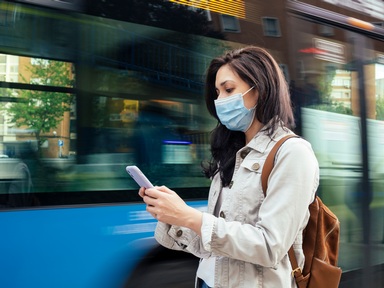Care workers and NHS staff who are double jabbed can work rather than self-isolate
Double vaccinated care workers and NHS staff in England can keep working rather than self-isolate under 'exemptional circumstances', the government has confirmed.
 If health and care workers have been ‘pinged’ by the NHS Covid-19 app or contacted and told to self-isolate as a result of being a close contact of a COVID case by NHS Test and Trace, they can still work under certain conditions which include having daily negative coronavirus tests.
If health and care workers have been ‘pinged’ by the NHS Covid-19 app or contacted and told to self-isolate as a result of being a close contact of a COVID case by NHS Test and Trace, they can still work under certain conditions which include having daily negative coronavirus tests.
This guidance came into force on 19 July.
Care workers and NHS staff must have a negative PCR test and have daily negative lateral flow tests for a minimum of seven days, and up to 10 days or completion of the self-isolation period.
Sajid Javid: Government backed healthcare 'at every turn'
The government states any decision to allow workers to work must be made on a ‘case-by-case basis, and only after a risk assessment by the organisation’s management’. The decision must be authorised by the care organisation’s local director of infection prevention and control, the lead professional for health protection, or the director of public health relevant to the organisation.
Health Secretary Sajid Javid, who recently tested positive himself for Covid, said: “As we learn to live with this virus, it's important that we ensure frontline staff can keep providing the best possible care and support to people up and down the country.
"The government has backed healthcare services at every turn through this global pandemic and these new rules will fortify our collective defences against this awful virus, by allowing fully vaccinated frontline NHS and social care staff to continue to work when needed.”
Staff can leave self-isolation for work only
The government’s decision aims to lift pressure on the social care sector and the NHS, as cases of coronavirus rise across the country. Staff can leave self-isolation to attend work but will still remain under a legal duty to self-isolate as a close contact when not at work.
If a staff member tests positive for COVID, they must stay at home.
To limit the increased risk linked to going to work, staff must:
• Be fully vaccinated - received both doses of an MHRA approved vaccination, with 14 days having elapsed since the final dose.
• Undertake a PCR test and should self-isolate until they receive the result. They can only attend work if this result is negative.
• Undertake daily LFD tests prior to starting work each day. Test results should be reported to NHS Test and Trace via the web portal and to their duty manager. A staff member who has a positive LFD test during this period should not attend work and should arrange a PCR test as soon as possible.
• Staff working during this 10-day period should comply with infection control precautions and PPE should be properly worn throughout the day. Any breaches should be reported immediately to their line manager.
• If the staff member develops any COVID symptoms, they must stay at home and immediately arrange a PCR test.
UKHCA: 'Potentially helpful'
Colin Angel, policy and campaigns director for United Kingdom Homecare Association (UKHCA), said: “An easement which is designed to ensure that care and support can continue in exceptional circumstances where self-isolation requirements place people at risk is potentially helpful.
"The measures must be understood to be an exceptional arrangement which is underpinned by a risk assessment. In almost all instances it will need to be agreed with local public health professionals, who we understand are working at speed to develop processes to support local services.”
Care organisations have been hit with a number of guidance documents in the last few days, with the publication of admission to care home guidance on Friday night – which advised all newly-admitted residents to a care home, who have been discharged from hospital, from an interim care facility or transferred from another care home, to self-isolate, upon arrival for 14 days in their own room.
As late as the morning of 19 July, the government published its staff self-isolation exemption guidance. With positive Covid cases rising in England, care providers have expressed concern about a lack of clarity related to issues such as care workers' transport to and from work.
In a tweet, Vic Rayner, chief executive of the National Care Forum, which represents care providers, said: “Updated guidance published 9.18am on day of implementation!"
Her tweet goes on “… nothing about what exemptions mean re issues like public transport to and from work etc...”
Martin Green, chief executive of Care England said: “As the largest representative body for independent providers of adult social care, Care England recognises the need to maintain sufficient levels of health and social care staff and is glad that social care has been recognised as frontline too.
"NHS and care staff are experts in infection control added to which the vast majority have received both vaccinations which we hope, in conjunction with PPE and other infection control procedures will reduce the risk of transmission”.
Latest News
 29-Jul-24
Dementia Bus gives carehome.co.uk staff insight into life with dementia
29-Jul-24
Dementia Bus gives carehome.co.uk staff insight into life with dementia
 01-Mar-24
Find out the top care homes in 2024
01-Mar-24
Find out the top care homes in 2024
 21-Mar-23
UK's top care homes in 2023 revealed
21-Mar-23
UK's top care homes in 2023 revealed
 03-Jan-23
carehome.co.uk launches free care helpline
03-Jan-23
carehome.co.uk launches free care helpline
 13-Dec-22
5 mins with Emily Whitehurst, chief operating officer for Constantia Healthcare
13-Dec-22
5 mins with Emily Whitehurst, chief operating officer for Constantia Healthcare